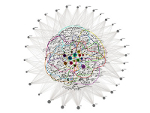 Outreach
Outreach
OUTREACH
Studying real time human mobility triggered by social events through online networks
Antònia Tugores, Jose Ramasco and Pere Colet, researchers from IFISC, use Twitter data to show the impact of social events on human mobility.
A team of researchers on social networks analysis from the “Institute for Cross-disciplinary Physics and Complex Systems” IFISC have studied how the “Via Catalana” can be depicted using geolocated tweets. “Via Catalana” was a human chain scheduled for yesteraday, September 11, the Day of Catalonia.
Researchers downloaded tweets mentioning “viacatalana” or including the hashtag #viacatalana, totaling about 175.000. They then selected those tweets that were geolocated, about 1000 for each two-hour period, and plotted the results on a map. It is important to remark that the data is unbiased and no processing was done prior to plotting.
Analysis of urban mobility is one of the active research lines at IFISC, which entails the study of data from on-line social networks. Some users had enabled the option that includes geolocated information as part of their tweets. Thils allows researchers to determine the user location at the posting time, and potentially to track their movements.
There was a call for a demonstation on September 11th in the center of Barcelona and for a human chain crossing Catalonia from North to South along the Mediterranean coast. By comparing this data with the one from an ordinary day it is possible to study how social events change people's mobility.
More information: web human mobility
![]()
![]()
![]()










